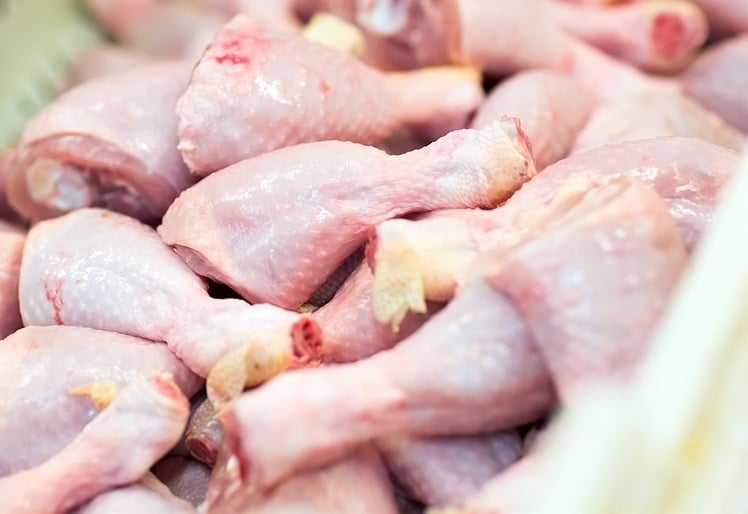November 19, 2025 | 03:14 GMT +7
November 19, 2025 | 03:14 GMT +7
Hotline: 0913.378.918
November 19, 2025 | 03:14 GMT +7
Hotline: 0913.378.918

Cheap imported chicken puts great pressure on domestic poultry production, which is facing many difficulties in output. Photo: HT.
Specifically, in 2018, Vietnam imported approximately 217,000 tons of chicken meat, increased to nearly 300,000 tons by 2019-2020, and decreased to 246,000 tons by 2022, accounting for about 21% of the total domestic consumption of chicken meat. Accordingly, on average, Vietnam consumes over 674 tons of imported chicken every day.
Particularly in the first 8 months of 2023, enterprises have imported more than 100,000 tons of chicken meat of all kinds. That is not counting the number of laying hens smuggled across the border into the Vietnamese market that have not been detected or arrested.
Worth mentioning, according to Mr. Nguyen Thanh Son, the Chairman of the Vietnam Poultry Association, our country now also imports waste layer products, chicken skin, chicken wings, chicken legs... typically, discarded whole laying hens, decapitated and chopped off, are imported from Korea by enterprises at very low prices. As a consequence, these cheap imported chickens are really putting great pressure on domestic poultry production, which is facing many difficulties in terms of output.
"Compared with countries with developed livestock production, the technical regulations on importing livestock products of our country are still unclear and lack of strictness. For example, since 2014, the use of Ractopamine, Cysteamine as a growth stimulant, creating lean for livestock has been banned in 160 countries around the world, including in our country because of the risk of causing cancer to users." VIPA Chairman, Mr. Nguyen Thanh Son emphasized.
According to Mr. Nguyen Thanh Son, the paradox is that every year, Vietnam still imports a large amount of pork, beef and chicken from some countries that still allow the use of these two substances for livestock and poultry. Meanwhile, in order to export livestock products, Vietnamese enterprises have to face a lot of strict technical barriers from importing countries, making Vietnam's livestock products disadvantaged in the domestic market.
The President of VIPA suggested that, in order to create a healthy and equal competition environment for domestic businesses and breeders, especially without creating a risk of adversely affecting consumers' health, the Government should promptly promulgating documents banning the import of meat products from countries using growth stimulants Ractopamine, Cysteamine.
At the same time, relevant ministries and branches should immediately implement non-tariff measures to protect domestic production and consumers' health. To soon build technical barriers in a reasonable manner and in line with international practices, which can refer to the experience of Thailand and some countries in the region in order to limit the trade deficit of poultry and poultry products as in the past time.
Translated by Bao Ngoc

(VAN) 'If we can address disease challenges and properly plan farming zones, Vietnamese shrimp can absolutely rise to lead the world,' Mr. Le Van Quang affirmed.

(VAN) The year 2025 continues to mark a significant footprint for Chanh Thu Fruit Import-Export Group Joint Stock Company (Chanh Thu Group) in the international market.

(VAN) Participating in the exhibition celebrating the 80-year tradition of the Agriculture and Environment sector, Dong Giao Food Export Joint Stock Company (DOVECO) showcased a range of products utilizing new technologies.

(VAN) Vietnam’s pepper export turnover in the first 10 months of 2025 reached $1.39 billion, already surpassing the full-year figure of 2024.

(VAN) AGRITECHNICA 2025 has impressively reaffirmed its position as the world’s leading trade fair for agricultural machinery.
/2025/11/17/4947-2-104601_225.jpg)
(VAN) The international market is growing rapidly, creating major opportunities for Viet Nam's tilapia industry.
/2025/11/17/1234-2-010716_981.jpg)
(VAN) Deputy General Director of Viet Nhat Group Nguyen Dang Ngoc shared experiences on building linkage chains and developing sustainable tilapia farming that meets international standards.